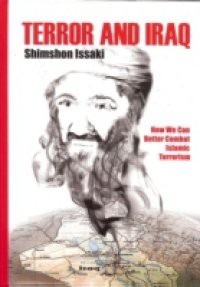Why Iraq became the center of the "GLOBAL JIHAD" for Al Qaeda and its terror organizations associates? Will the evacuation of the allied forces in Iraq reduces the terror actions against the western world by Al Qaeda? Iraq is only a suitable "battle ground" for conducting terror activity against the "infidels". Ossama Bin Laden, prepared the grounds for, what seemed to him at that time, a possible second war against Saddam Houssein by the United States. For this purpose, he established his infrastructure in Northern Iraq. The book is dealing with the situation in the world, AFTER the evacuation of the allied forces from Iraq. Almost seven years after the 911 terrorist attacks in the United States, Islamic terrorism is still a dominant force in the world: i Ossama bin Laden and his associates around the world have succeeded in carrying out large-scale bombings in the UK, France, Spain, Saudi Arabia, Egypt, Jordan, Indonesia, and elsewhere. * Terrorism is a daily reality in Iraq and in Israel, with the "generous" assistance of Iran and Syria, which continue to sponsor, host, and encourage terrorism in the Middle East. * Al-Qaeda is still "alive and kicking", planning still more attacks. Bin Laden, Abu Massab al-Zarqawi, and most of Al-Qaeda's senior operatives have not been apprehended yet; they enjoy both popular and financial support from Muslims around the world; and they are determined to and capable of carrying out further assaults against the West, Israel, and moderate Muslims. Today, virtually no country is "immune" from Islamic terrorism. This fact may seem puzzling, in light of the vast and diverse resources the free world, and especially the United States, has allocated in recent years in order to defeat Islamic terrorism. It is this puzzle or paradox that has driven me to "come out of the shadows" and write this book. I have served for more than 40 years in Israel's leading intelligence services. Retiring from the secret services at a rank equivalent to Brigadier General, I have devoted my career to combating Islamic terrorism -- by collecting and analyzing intelligence, directing covert operations in the field, and collaborating with intelligence organizations worldwide. In writing this book, I have benefited from another source of insight. I was born in Iraq in 1934 and spent 16 years in Basra, before escaping to Israel in 1950. In Iraq, I became socialized into the Arab culture, language and mentality -- assets that have helped me understand the phenomenon of Islamic fundamentalism, and its birthplace -- the Arab Middle East. Such insights guided me in one of my previous works, titled In the Eyes of the Arabs -- The Six days War, written about the strategies of the Arabs that led to their defeat in the Six Days War of 1967. My main argument in this book is that the counter-terrorist measures that have been deployed so far (ever after 9/11), especially by the United States, have been deficient and partial. A prominent example is the 9/11 Commission Report, published in July 2004. The report, undoubtedly, has many good points, but it also suffers from significant shortcomings: * The office of the Director of National Intelligence (DNI), a new body that was created at the report's recommendation, has little practical authority vis-a-vis the big established organizations in the defense, intelligence and policy community. * "Gloves-on" treatment of the Al-Qaeda-Saudi connection. It seems that the committee tried hard to be "politically-correct", and refrained from delineating stringent measures against Saudi-backed institutions and associations that support (financially, morally and otherwise) hostile terrorists actions. * Vague and theoretical guidelines concerning the dissemination of critical material between the CIA and the FBI -- recognized as a crucial failure regarding the 9/11 attacks. * Half-way measures on immigration. With all due concern to humanitarian issues, the committee should have recommended not only to raise the standards concerning incoming immigrants, but also to take measures against those that have already succeeded in entering the country. Below are a few more instances of deficient measures against terrorism: * The terrorist still have enough money! Undoubtedly, many important steps have been taken since 9/11 in this area. But the cash that still flows to the terrorist organizations is sufficient to carry out deadly attacks world wide. One such "financial fountain" is located in Saudi Arabia and the Gulf states. According to a reliable source I debriefed, Bin Laden's family, with the implicit consent of the Saudi regime, still sends money to Al-Qaeda. Numerous Islamic associations still receive money from these countries, and some of it goes to hostile activities in the U.S. and other countries. * "Under our noses" - lack of vigilance in apprehension in investigation. There are several such instances prior the 9/11 attacks, that if handled properly could have prevented the attacks, as well as the bombings in Kenya and in Tanzania. In my book, I explore in depth these cases, in order to draw from them valuable counter-terrorist lessons. Such lack of vigilance also characterizes the public in the West (in Israel, on the other hand, high public awareness has led to the foiling of many terrorist attempts). * The world, especially the Muslim world, still isn't "buying it"! The states on the frontier of the war against terrorism, especially the United States and Israel, still have great difficulties in persuading Europeans, and especially Muslims, of the different measures required to combat terrorism. The upheaval surrounding the cartoons of the Prophet Mohammed illustrates the difficulties of winning the "war of consciousness" or "battle of narratives" versus the Muslim world. The purpose of this book, therefore, is to better equip the free world - governments, counter-terrorism organizations, academic analysts, and concerned citizens - with the insights and tools necessary to win the war on terrorism. It does so by suggesting novel and more effective methods for combating Islamic terrorism, especially that perpetrated and espoused by Al-Qaeda.

